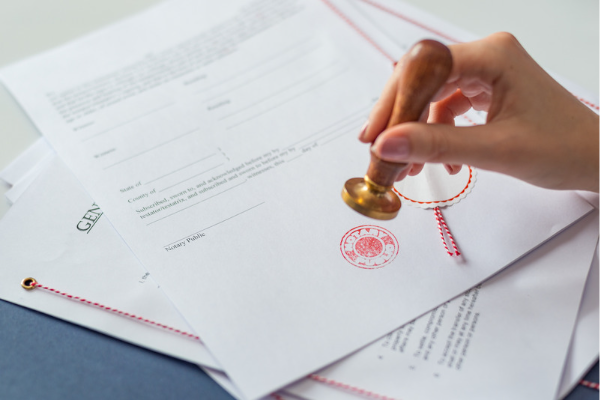If your application for Medicaid has been denied or delayed, you have the right to a…
Remote Notarization was authorized in New York State in accordance with section 135-c of the Executive Law, effective February 25, 2022.
On January 31, 2023, notaries wishing to provide remote notary services will have to register with the Department of State. On that date, new regulations will go into effect with additional requirements for electronic notaries.
New York State has issued a FAQ which provides information on what is currently allowed under the remote notary statute: https://dos.ny.gov/notary-public
The following briefly summarizes this FAQ:
What is remote notarization?
“Remote notarization” is a form of notarization where the notary officiates the document remotely through audio-visual technology and other security protocols. Remote notarization can be performed by a notary public by traditional ink (e.g., pen) or electronic signature.
How is remote notarization performed?
To provide a remote notarization, the notary public must be physically located within the State of New York at the time of the notarization. The notary must identify the remote signor (also known as the “principal”) of the document through any of the following three methods:
- the notary’s personal knowledge of the signor;
- by means of communication technology that facilitates remote presentation by the signor of an official, acceptable form of ID, credential analysis, and identity proofing; or
- through oath or affirmation of a credible witness who personally knows the signor, and who is either personally known to the notary or identified by the previously referenced means of communication technology.
Regardless of the method used to confirm the identity of the signor, the notary must be able to see and interact, in real-time, with the remote signor of the document through audio-visual communication technology. This technology must have security protocols in place to prevent unauthorized access. The notary must make and keep an audio-visual recording of the remote notarization and ensure that there is a back-up of the recording.
After the remote signor has executed the document, it must be transmitted to the notary public for officiating. The notary must confirm that the document is the same as the one signed remotely in the notary public’s presence before applying the notary stamp and signature to the document. The following statement must be added: “This remote notarial act involved the use of communication technology.”
The regulations will address the requirements and procedure to be followed as to credential analysis and identity proofing.
How long must a notary retain the audio-visual recording of each remote notarization performed?
A recording, containing both audio and video, of the remote notarization must be retained by the notary for at least ten (10) years. The notary must take reasonable steps to ensure a backup recording of the remote notarization exists and is secured from unauthorized use.
Is a notary journal required?
Yes, the notary public must keep a journal of all remote notarizations performed. Each journal entry must be made contemporaneously with the performance of the notarial act, and each entry must contain certain required information. The journal must be kept by the notary public for as long as they remain a notary and for an additional five years thereafter
How much can a notary charge for remote notarization?
A notary public may charge $5.00 per act/signature. If the notary is not performing a remote notarization, the fee cannot exceed $2.00 per act.
Does the notary have to provide remote notary services?
No, if the notary does not have the appropriate technology or capability to provide such services or does not wish to engage at all in remote notarization, a notary may decline to provide remote services. Additionally, a notary may and should refuse to provide remote notary services if the notary does not believe the person signing the document remotely has capacity to sign or if the notary does not believe the remote signor is signing the document voluntarily.
Do notaries have to register with the Secretary of State to provide remote notary services?
Any notary public commissioned by the NYS Department of State can act as a traditional or remote notary. On January 31, 2023, the rules for remote notarization will change. There will be a separate fee to be paid to the NYS Department of State, Division of Licensing Services to act as an electronic notary.
Will remotely notarized documents be accepted by a county clerk or other government offices?
Yes, if the record has been certified by a notary public or other individual authorized to perform a notarial act.
New Legislation- What will Change on January 31, 2023?
On January 31, 2023, notaries wishing to provide remote notary services must register with the Department of State as an electronic notary. On this date, regulations will go into effect placing additional requirements on remote notary services and providing for additional standards relating to a notary’s use of an electronic signature. Additional information will be posted on the NYS website (https://dos.ny.gov/notary-public) once the regulations have been proposed and adopted.




Comments (0)